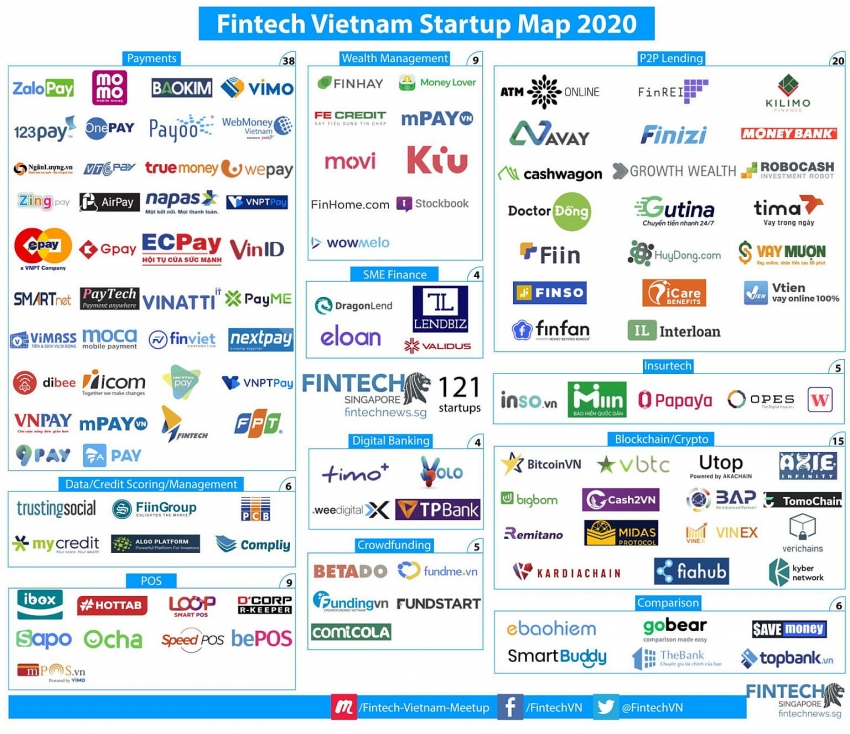Vietnam fintech startup go from 44 in 2017 to 121
 |
| Fintech Vietnam Startup Map 2020 (Source: Fintech News Singapore and Switzerland Global Enterprise) |
Accordingly, the number of fintech startups in Vietnam grew more than 179 per cent between 2017 and 2020. Payment remains the biggest segment, representing 31 per cent of all fintech startups.
As of October 2020, Vietnam was home to 39 licensed non-bank payment services providers, with the five biggest e-wallets being MoMo, Payoo, Moca, ZaloPay, and ViettelPay.
Statistics from the State of Bank of Vietnam (SBV) revealed that as of 2019, there were 4.2 million e-wallet users out of the country’s population of 100 million people, implying that despite a rather crowded and highly competitive local payment sector, there are still plenty of growth opportunities, stated the report.
While Vietnam’s payment startups continue to grow and attract investors’ interest, the strongest growth was actually recorded in peer-to-peer (P2P) lending and the crypto/blockchain space. These two segments saw the number of startups rise from less than five in 2017 to more than 15 startups in 2020.
The past three years also saw the emergence of insurtech, digital banking, and small- and medium-sized enterprises (SMEs) financing, three segments that were non-existent in 2017.
Fintech News Singapore emphasised that despite notable traction and strides, Vietnam’s fintech sector remains nascent when compared to neighbouring Singapore for example, and segments including data/credit/scoring management and crowdfunding are still unrepresented.
The domestics fintech sector is largely comprised of players operating under a business-to-consumer model, making the underdeveloped business-to-business (B2B) market poised for growth.
At the same time, Vietnamese banks are accelerating their digital transformation, with a growing number of them adopting a partnership approach to enable rapid innovation. This provides B2B startups with plenty of opportunities to support incumbents in their digital efforts.
In the fintech sector, these so-called “super apps” are rapidly gaining ground, leveraging their advanced tech platforms and expertise to deliver cheap and convenient digital financial services to the masses.
More developments are expected in the near future on the back of favourable regulations. These include the forthcoming fintech regulatory sandbox as well as a legal framework for digital assets and cryptocurrency, the report said.
What the stars mean:
★ Poor ★ ★ Promising ★★★ Good ★★★★ Very good ★★★★★ Exceptional
Related Contents
Latest News
More News
- VNPAY and NAPAS deepen cooperation on digital payments (February 11, 2026 | 18:21)
- Vietnam financial markets on the rise amid tailwinds (February 11, 2026 | 11:41)
- New tax incentives to benefit startups and SMEs (February 09, 2026 | 17:27)
- VIFC launches aviation finance hub to tap regional market growth (February 06, 2026 | 13:27)
- Vietnam records solid FDI performance in January (February 05, 2026 | 17:11)
- Manufacturing growth remains solid in early 2026 (February 02, 2026 | 15:28)
- EU and Vietnam elevate relations to a comprehensive strategic partnership (January 29, 2026 | 15:22)
- Vietnam to lead trade growth in ASEAN (January 29, 2026 | 15:08)
- Japanese business outlook in Vietnam turns more optimistic (January 28, 2026 | 09:54)
- Foreign leaders extend congratulations to Party General Secretary To Lam (January 25, 2026 | 10:01)

 Tag:
Tag:


























 Mobile Version
Mobile Version